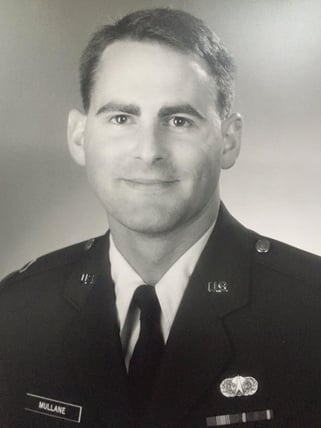
Back in the waning days of the Cold War, I entered the US Air Force as a newly-minted second lieutenant out of the University of Notre Dame’s ROTC program with a degree in mathematics. I was assigned to an intelligence-related unit in California and served for a little over four years, loving every minute of my time. When the time came to explore the world beyond the military, I found myself well-prepared in some ways, but under-prepared in other ways. Read on for tips on how to prepare for your own career transitions, be it from military to civilian life, or from school to the "real world."
During my time in the US Air Force, I managed a team of around 20 contractors and military personnel operating satellite systems, getting fantastic leadership experience while being entrusted with more than a billion dollars of hardware that informed senior decision makers in Washington on a daily basis. With 25 years of general management experience behind me, I've often said that I had more responsibility during those four years than I’ve had since. The US military’s trust in young men and women is unsurpassed and, in virtually all cases, that trust is well placed. Officers and troops often succeed in ways that belie their experience.My search for a soft landing
As a junior military officer (JMO) exiting the service at 27 years old, I was terrified of how my military skills would (or, more fearfully, would not) translate to the private sector. But like all of those separating from the service, the time came to make the leap and I took a job at an auto parts manufacturing and distribution company, managing a location in Omaha, Nebraska where I quickly realized that in so many ways, I was much better prepared than I thought.
Leadership aspects of the job came naturally to me as did decision-making. But I couldn’t shake this nagging feeling that I was missing some key skills and so began considering returning to school. I researched what an MBA was and ultimately decided that business school was likely the best path for me.

So apply I did, to several MBA programs. To my suprise, I was accepted at the Harvard Business School (HBS) and spent two years there from 1997 to 1999 getting my MBA. It was one of the most amazing experiences of my life, truly transformative.
If I was afraid of how competitive I’d be in the private sector coming out of the military, I was even more afraid of the rigors of an MBA program. I prepared as best I could, taking an accounting course at the University of Nebraska in the months leading up to my matriculation at Harvard. I was also required by HBS (as were many others from non-business backgrounds) to complete some work before beginning the program that ostensibly got me to a level of expertise that would put me, if not on par, close to on par with my classmates who would be coming out of banking and consulting. The extra preparation helped and, two years later, I had my MBA and was ready to dive back into the private sector pool.
After stints in a startup and as the CEO of a manufacturing company (among other things), I am now the Executive Director of HBX, the Harvard Business School’s digital education initiative. I often think back on my days as a JMO worrying about how to best have a “soft landing” in the private sector. Specifically, I think of how much easier it is today to prepare for that landing in an age of online offerings that aim to educate people from all walks of life.
Tip 1: Brush up on business fundamentals
MOOCs (Massive Open Online Courses) such as EdEx and Coursera offer courses that teach an array of business disciplines and they can be a good option for getting some fundamentals down and showing potential employers your seriousness and intellectual curiosity. Some of these courses are offered at no charge but provide for the option to receive a “verified certificate” upon completion of the class for a nominal fee. Others charge when you register. The quality and depth of courses can vary substantially so it’s worth studying the syllabus and, to the extent possible, sampling the course to be sure it will meet your needs.
At HBX, our Credential of Readiness (CORe) program is another fantastic option to learn the language of business in one, integrated program. The course covers three fundamental disciplines: Economics for Managers, Business Analytics, and Financial Accounting. While the practices learned are important, perhaps more impactful is how students say that the course gave them a confidence and a language they never had before.
As HBS has done for more than a century, instruction in CORe is accomplished through the case method of study. This pedagogy relies on real-world issues addressed by real-world managers (we call them protagonists since they are central figures in a story) that require the student to learn by discovery in concert with his or her peers. Just as in the HBS classroom, students learn from others who have different experiences and expertise through an online peer help function. Unlike MOOCs, which are generally a standard platform that content “slots” into, HBX is a platform custom-built to facilitate the case method and the student community necessary to make such a method of teaching effective.
Tip 2: Get your resume ready for prime time
If you are just getting out of the military, it’s likely been a while since you created a resume. Take the time to do it well. Besides the usual advice to ensure you have correct grammar and spelling, there are several other things that JMOs (and anybody else for that matter) should keep in mind given the mistakes I’ve seen people make when I was the hiring manager.
First, if you use a personal statement or “objective” statement of some kind at the top of your resume, ensure that it’s about the employer and not about you. Having an objective statement that says: “To find a job that allows me to further develop my leadership skills and one day become a senior manager in a manufacturing firm” is much less appealing to an employer than: “To use my leadership skills to build, train and drive a high performance manufacturing team that delivers on time and on budget.” The first statement is about what you want. The second is about what you can do to help your future employer.
Second, keep it short. In general, no matter how many great things you have to say about yourself, if it takes too much room to say them, people will lose interest. For most JMO’s I’d argue that your resume shouldn’t be more than one page if you’re exiting the service as a 26-year-old O3. Of course, if you have more experience, dipping into two pages is fine but beyond that I think little is gained and you risk turning off the reader.
Third, spend time taking the jargon out of your resume. This also applies to people changing industries. Thinking back to my military experience, a government description of my duty would have been something like “Managed a team operating national security assets providing 24/7 intelligence coverage used to inform the national command authority.” While accurate, much will be lost on somebody who has not served. Saying that I “operated satellites that gathered intelligence used to inform the President daily” was much shorter, simpler, and impactful.
Click here to see part 2 of Patrick's post!
About the Author
Patrick Mullane is the Executive Director of HBX and is responsible for managing HBX’s growth and long-term success. A military veteran and alumnus of Harvard Business School, Patrick is passionate about finding ways to use technology to enhance the mission of the School - to educate leaders who make a difference in the world.








